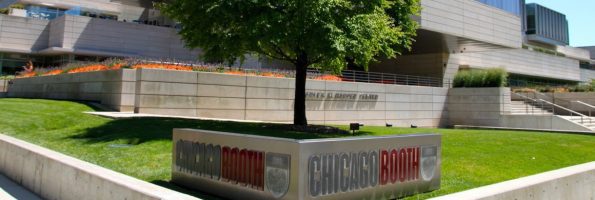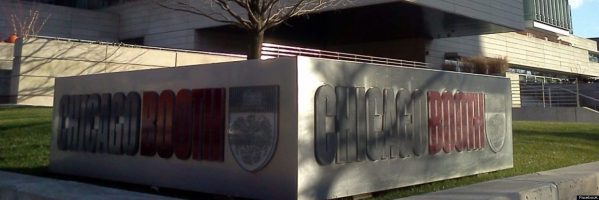Americans Are Disconnected With Upward Mobility, Says New Kellogg Research – Chicago News

Let’s explore some of the most interesting stories that have emerged from Chicago business schools this week.
How Closely Do Our Beliefs About Social Mobility Match Reality? – Kellogg Insight
New research from Northwestern Kellogg Assistant Professor of Managerial Economics and Decision Sciences Edoardo Teso assessed mobility rates among social classes in the U.S., U.K., France, Italy, and Sweden and found that Americans’ overestimated and Europeans underestimated “people’s chances of climbing from the bottom to the top of the economic ladder.”
According to the article, Teso wonders whether the disconnect between people’s perceptions compared to the reality of social mobility might “explain why the United States often resists income redistribution policies such as higher taxes for the wealthy, while many European nations embrace them.”
“These perceptions are really deeply rooted,” Teso notes.
“America is famously a land of immigrants where many people did in fact build their own fortunes. In contrast, Europe practiced feudalism for centuries, during which a person’s fate was largely governed by their family circumstances,” Teso’s research claims.
You can read more about research here.
PIMCO and University of Chicago’s Center for Decision Research Announce Partnership to Guide Wiser Decision-Mking – Booth School of Business News
To commemorate the partnership between Chicago Booth’s Center for Decision Research (CDR) and PIMCO, an “innovator in applying research to investment decisions,” the CDR laboratories will be rechristened the PIMCO Laboratories for Decision Research, which will “yield scientific discoveries with the potential to improve individual and social welfare.”
PIMCO Group CIO Dan Ivascyn writes, “Through this novel partnership, we hope to nurture exceptional insights into decision making behavior that will ultimately help PIMCO make wiser decisions for portfolios, clients and employees.”
Booth Dean and George Pratt Shultz Professor of Accounting Madhav Rajan writes, “PIMCO’s spirit of experimentation and interest in asking real-time questions about investing and the economy make it the ideal partner for Booth.”
According to the press release, the PIMCO Decision Research Laboratories will “include a new ‘storefront’ behavioral science research lab to foster greater engagement with the public and to broaden the reach and increase diversity of participants in the research studies.”
Rajan continues, “From PIMCO’s plans to disseminate CDR’s research findings, to conducting joint projects in behavioral science, the collaboration will have a transformational impact on our research enterprise.”
You can read more about the partnership here.
MBA Student Carley Mostar Secures Funding for Her Community – UIC Business Blog

Carley Mostar, Gies MBA ’19
The UIC Liautaud Graduate School of Business recently profiled Carley Mostar, MBA ’19, whose “Info Park” project secured $25,000 in funding from the Ford College Community Challenge (Ford C3).
Conceived as a collaboration between Mostar, the UIC School of Architecture, and the community of East Garfield Park, Mostar dreamt a plan to transform “one of the lots into a member-use space for the community to use as our own public or private space.”
Mostar and the group have hit the ground running, working with “community engagement workshops and have even started researching fabricators and vendors to work with in preparation for construction, slated to start in early spring of 2019.”
Mostar explains the importance of incorporating the voices of the community into her “Info Park” plan.
“It’s very important to me when doing this kind of work to make sure that the people who the work is for have their voices centered in the outcome of the project,” she says in a recent interview.
You can read more about Mostar and the project here.
Chicago Booth Expands Deferred Admission MBA Program to All Students

The University of Chicago Booth School of Business announced this week that it has expanded its deferred admission MBA program. Previously limited to undergraduates at the University of Chicago, it is now open to any student in their final year of study at any undergraduate institution.
Chicago Booth Scholars
The Chicago Booth Scholars program gives talented undergraduate seniors the opportunity to apply for a place in a future Booth MBA class. Those who gain admission can then complete two to four years of full-time work experience before heading to Booth for their MBA.
In an effort to provide ultimate flexibility, participants in the expanded program can chose between the full-time MBA program at the Hyde Park campus or the evening and weekend MBA program at the downtown campus.
“Continuing to build the most talented and diverse classes of MBA students is a priority for Chicago Booth,” Dean Madhav Rajan notes in a recent statement.
Why Expand?
Chicago Booth has chosen to expand its deferred admissions MBA program, which launched in 2002 exclusively for University of Chicago undergrads, in an effort to draw great talent from across the nation and the world.
“This program is extremely successful in terms of the caliber of students it has attracted and the excellent alumni that come out of it,” Stacey Kole, Chicago Booth deputy dean for the MBA program, said in a statement. “There is great talent beyond our own university, which is why we are opening this opportunity to students attending other colleges and universities.”
To Apply
The next application deadline is April 4, 2019, and the $250 application fee will be waived for all Chicago Booth Scholars applicants. One advantage of the program is that it lets college students complete the MBA admissions process—including taking the GMAT or GRE—while they are still in test-taking mode and before they enter the busy working world.
You can learn more about the expanding Chicago Booth Scholars program here.
This article has been edited and republished with permissions from Clear Admit.
Chicago Booth Alum Donates $10 Mil to Support Priority Initiatives

University of Chicago Booth School of Business alumnus Dave Liguang Chenn (MBA ’00) recently donated $10 million to support several priority initiatives at Booth. Chenn’s donation will go toward Booth’s new Hong Kong Center, scholarships for both graduate and undergraduate students, and the UChicago Innovation Fund managed by the Polsky Center for Entrepreneurship and Innovation.
Booth Dean Madhav Rajan expressed deep gratitude for Chenn’s substantial donation. “This generous gift will have a transformational and lasting impact on areas of great need at the College and of high priority at the university and Chicago Booth.”

Dave Liguang Chenn, Chicago Booth MBA, ’00
Here’s how Booth plans to divvy up Chenn’s $10 million donation:
- $3 Million to the Hong Kong Center: The University of Chicago Center in Hong Kong is home to the Booth Executive MBA program in Asia, multiple study abroad programs, the Hong Kong Jockey Club Programme on Social Innovation, and various research projects. When the Center officially opens in July 2018, one of the premier spaces at the Center will be named after Chenn.
- $4 Million to Scholarships: Specifically, $2 million will go toward scholarships for full-time MBA students while an additional $2 million will go toward the Odyssey Scholarship Program for undergraduate students. In recognition, a house in the Woodlawn Residential Commons will be named after Chenn when it opens in the fall of 2020.
- $3 Million to Innovation Fund: The final $3 million will go toward the UChicago Innovation Fund, which provides proof-of-concept funding to university-affiliated ventures and technology. These funds will provide early capital for ideas with the most disruptive potential.
Chenn explained the impetus behind his generosity: “Since my graduation from Chicago Booth many years ago, I have always appreciated the values and the principles that had been taught in this fine institution and the many great lifelong friends I had met there. I hope my contributions will help the university and Booth to attract the best students from around the world, and enhance their global impact, particularly in Asia, with the new campus in Hong Kong.”
Read the press release to learn more about how the University of Chicago and Booth School of Business will put Chenn’s money to use.
This article has been edited and republished with permissions from our sister site, Clear Admit.
Chicago Booth Alum Pair Give $75 Million to Their Alma Mater

The University of Chicago Booth School of Business’s coffers just grew—and its top scholars will be called by a new name—thanks to a $75 million alumni gift announced today. In recognition of the gift, students who earn highest academic honors while at Booth will be known as the Amy and Richard F. Wallman Scholars, after donors Amy Wallman, MBA’75, and Richard Wallman, MBA’74. The Wallmans’ gift will be used to support several initiatives, including scholarships for students in the full-time, evening, weekend, and executive MBA programs, as well as enhanced co-curricular programming, faculty research, and emerging priorities.
“We have great affection for the University of Chicago—the Booth School of Business is world class, and we hope our gift makes it even better,” Amy Wallman said in a press release. “The Booth School is very special to us not only because we met there,” Richard Wallman added, “but also because we have sponsored 26 scholarship recipients over the years and are delighted to have had a modest impact on these students’ lives.”
Amy Wallman began a 26-year career at EY after completing her Booth MBA, retiring as an audit partner in 2001. She later served as director at pharmaceutical firm Omnicare from 2004 to 2015. Richard Wallman began his post-MBA career with the Ford Motor Company and went on to serve as chief financial officer and senior vice president of Honeywell International Inc., a diversified industrial technology and manufacturing company, and its predecessor AlliedSignal, from 1995 to 2003. He also held senior financial positions with IBM and Chrysler Corporation.
Dean Madhav Rajan, who took the helm at Chicago Booth this past July, welcomed the generous gift, calling it an “endorsement of Chicago Booth’s enduring strengths, in our programs and our extraordinary faculty.” Continued success rests on maintaining and extending the school’s prominence in research and in developing the world’s next leaders, he added.
“The Wallman Scholars will be recognized as preeminent in this cadre of future leaders, modeling the potential and the spirit of their benefactors,” Rajan said. The permanent designation will be bestowed upon graduating MBA students who earn high honors at Booth. It will also be given retroactively to top alumni, according to the school’s press release.
YOU MIGHT ALSO LIKE: Chicago’s Best 1-Year MBA Programs
The Wallmans, for their part, shared that they were impressed with Rajan’s vision for the school and hope their gift will help advance that vision. “This is a unique opportunity to make a difference in the careers of Chicago Booth students for generations to come and express our gratitude to those who have helped us,” Amy Wallman said in the press release. “Our parents were great role models to both of us; they gave us the confidence that we could accomplish anything.”
Richard Wallman also shared appreciation for the impact working for former Honeywell International Chairman and CEO Larry Bossidy had on his career and his life and thanked friends at Centerbridge Partners and Merrill Lynch, whom he called “key enablers of this gift.”
For more about the Wallmans’ $75 million gift to Chicago Booth, click here.
This article has been edited and republished with permissions from Clear Admit.
Chicago Booth Names Stanford GSB Professor as Its Next Dean

The path from the Stanford Graduate School of Business (GSB) to the University of Chicago Booth School of Business is becoming well worn, as Chicago Booth prepares to welcome its second consecutive dean from the Palo Alto campus. Madhav Rajan, who chairs the accounting department at Stanford GSB and served as Senior Associate Dean for academic affairs from 2010 to 2016, will take the helm at Booth on July 1, the school announced yesterday.
Sunil Kumar, who served as Chicago Booth’s dean from 2011 until leaving to become provost of Johns Hopkins University in July 2016, also came from Stanford, where spent 14 years, ultimately in the role of Senior Associate Dean. Since his departure, Douglas Skinner, also an accounting professor, has served as Interim Dean as Chicago Booth conducted a global search for a successor.
“We sought the most outstanding candidate whose values, ambition and abilities fully comport with the distinctiveness of Chicago Booth as one of methodological rigor in its research and education, and through that commitment one of high impact on the world,” President Robert J. Zimmer and Provost Daniel Diermeier said in a statement announcing Rajan’s appointment yesterday.
As Senior Associate Dean for academic affairs at Stanford GSB, Rajan led the school’s MBA program, including overseeing admissions, curriculum, the student experience and career management. While at the GSB, Rajan also launched new joint-degree programs with Stanford’s engineering school and led initiatives toward greater integration of the business school within the larger university.
He also served as boss to Derrick Bolton, Stanford’s long-serving Admissions Director. In an interview with Clear Admit in August 2016, Rajan shared that he had, in fact, pushed Bolton to pursue other opportunities, perhaps contributing to Bolton’s decision to leave the GSB this past September to head the recently launched Knight-Hennessey Scholars Program.
“I had been encouraging him to think about other things he could do because it is a difficult job and he has been doing it for 15 years,” Rajan told Clear Admit. “The way he does it, the intensity he brings to it, the effort level—I was amazed that he did it for as long as he did it.”
A Compassionate, Supportive Leader
Rajan’s comments to Clear Admit suggest that he is a compassionate, supportive leader who offers those who work for him the autonomy to chart their own course. Of Bolton he said, “There is literally nobody at the GSB who works harder than Derrick. The amount of time, love and dedication that he puts into admissions is amazing and beyond what anyone could be expected to do. That level of commitment I have never seen from anybody, frankly.”
Asked if Bolton’s replacement (who has yet to be named) might change the school’s enduring essay prompt, Rajan offered further insight into how he leads. “That will be completely up to the new admissions director,” he said. “We have very much a notion of empowering people in their roles here, and the person hired to manage admissions will have complete latitude to run things the way he or she sees fit.”
A Beloved Teacher and Respected Scholar
Rajan has also won accolades for his teaching. In 2000, the University of Pennsylvania’s Wharton School bestowed upon him the David W. Hauck Award, its undergraduate teaching award. He taught at Wharton before Stanford, from 1990 to 2000. Next month, he is also slated to receive the Robert T. Davis Award for lifetime service and achievement, the GSB’s highest faculty recognition.
Rajan holds a bachelor’s degree from the University of Madras in his native India, as well as two master’s degrees and a Ph.D. from Carnegie Mellon University. His research has focused primarily on analyzing management accounting issues through an economics lens, especially as they relate to the choice of internal control and performance systems in firms. Cost Accounting: A Managerial Emphasis, which he co-authored, is the leading cost accounting textbook used around the world. He also served as editor of the Accounting Review from 2002 to 2008.
Returning to a School on the Rise
Rajan is not a stranger to Chicago Booth, having served as a visiting professor in 2007-08. In a release announcing his appointment, he expressed his respect for the school and his excitement to return. “The values I have in research and education are deeply valued at Chicago Booth,” he said. “People come here to do rigorous, empirically based research and analysis, which provides the basis for a transformative student experience and an extremely effective MBA curriculum. We have an exciting opportunity to take Booth’s deep strengths and leverage them here and around the world. I am thrilled to have the chance to be dean at what is unquestionably the greatest academic business school.”
Chicago Booth has been something of a rising star among leading MBA programs over the past decade, threatening Wharton’s previously undisputed place alongside Stanford and Harvard Business School (HBS) as the best business schools in the world. The Economist has ranked Chicago Booth the number one business school for five years running, from 2012 to 2016. And in last year’s U.S. News & World Report ranking, Booth tied with Stanford for second, behind HBS and ahead of Wharton.
Chicago Booth’s upward trajectory began under Edward Snyder, who preceded Kumar as dean from 2001 to 2010. In that time, the school almost doubled its number of endowed professorships, more than tripled its scholarship assistance to students, moved to a new Hyde Park campus, expanded its presence in Singapore, established a new campus in London, successfully completed a capital campaign and more than doubled its endowment. Snyder also successfully courted an unprecedented $300 million naming gift from alumnus David Booth before leaving to lead the Yale School of Management. Kumar continued that momentum, helping raise more than $300 million, focusing on student recruitment—including increasing the female enrollment of full-time programs from 35 percent to 42 percent—and expanding courses for undergraduates. Now it’s Rajan’s turn to take the baton. It will be interesting to see what his leadership holds in store.
This article has been edited and republished with permissions from Clear Admit.
